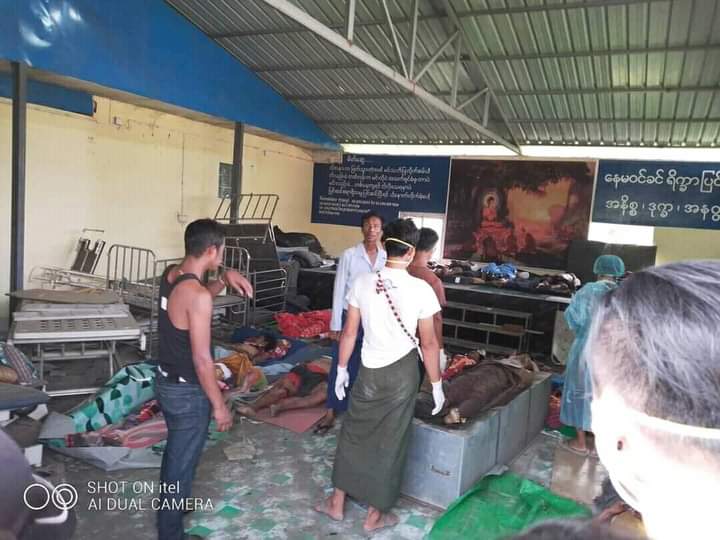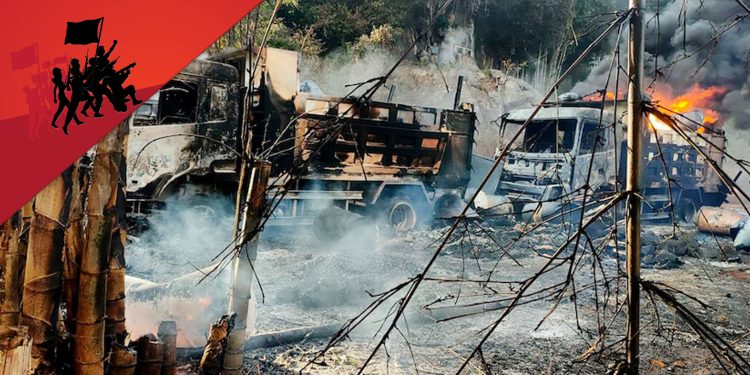Repeated failures by the international community, including the UN and ASEAN, to act decisively have emboldened Myanmar’s junta to massacre hundreds of civilians and resistance forces opposing military rule.
The junta launched its brutal crackdown on peaceful, unarmed pro-democracy demonstrators soon after last year’s coup in February, firing live rounds at crowds of anti-regime protesters.
After witnessing the killings of several protesters, 23-year-old network engineer Nyi Nyi Aung Htet Naing pleaded for international intervention in a Feb. 27 Facebook post that asked “How many dead bodies are needed for the UN to take action?”
The next morning, he was shot dead by regime forces.
He was among at least 15 protesters killed by the regime in a brutal crackdown on a peaceful demonstration.
Twenty months later, the United Nations and Association of Southeast Asian Nations have failed to take action against ongoing massacres of civilians by junta forces.
Trigger-happy troops killed around 80 protesters across the country on March 14 last year alone. Yangon’s industrial hub of Hlaing Tharyar Township saw the biggest massacre that day, with more than 50 demonstrators, bystanders and pedestrians killed and several-dozen injured in a cold-blooded crackdown.

Another 110 anti-regime protesters were slaughtered two weeks later on March 27, as the junta marked the 76th Armed Forces Day.
Faced with resistance from locals defending themselves with slingshots and improvised firearms and land mines, regime troops killed 40 villagers including children during two days of raids on villages in western Depayin Township, Sagaing Region in early July 2021.
In the same month, the bodies of around 40 people – including a child, a disabled person and a senior citizen – killed by junta soldiers were discovered in the resistance stronghold of Kani Township, Sagaing.
Myanmar’s parallel civilian National Unity Government demanded action from the UN security council to stop the mass killings of civilians. None came.
The UN and international community’s repeated condemnations minus action only encouraged the junta to continue its campaign of massacres against Myanmar’s people.
On Dec. 24 last year, 35 civilians including children, women and two members of the international humanitarian group Save the Children were burned alive in seven vehicles by regime forces as they fled a clash between resistance fighters and junta troops in Hpruso Township, Kayah State.
May brought yet another murderous atrocity when junta troops slit the throats of 29 villagers and burned their houses during a raid on Mon Taing Pin Village in Ye-U Township, Sagaing.
In September, a junta airstrike and infantry attack on a school in Let Yet Kone Village in Sagaing’s Depayin Township killed nine children and six adults.
When even that massacre failed to trigger international action, the junta used warplanes to bomb a concert in Hpakant Township, Kachin State on Oct. 23. Around 75 people, including civilians, Kachin musicians and officers of the Kachin Independence Army were killed in the strike. Two more massacres by regime troops in Sagaing’s Monywa and Kantbalu townships in early November killed 32 more people, including resistance fighters.
As of Oct. 23, the junta had committed at least 20 massacres in which seven to 20 people were killed, the shadow civilian National Unity Government’s human rights minister, U Aung Myo Min, told The Irrawaddy on Thursday.
The UN is responsible for preventing such war crimes and crimes against humanity as part of its global mission to promote development and well-being for the world’s peoples, he added.
“The UN’s lack of action is spurring junta atrocities against Myanmar’s people,” said the human rights minister.
“We really feel frustrated by the inaction of the international community. It has been too slow [to stop the junta from conducting mass killings of civilians]. We were shocked by one citizen’s question asking how many people had to be killed before the UN takes action.”
The UN and ASEAN have faced severe criticism from the Special Advisory Council for Myanmar (SAC-M), an independent group of prominent former UN human rights experts, for giving the junta free rein to continue committing atrocities, mass killings of civilians, arson attacks and indiscriminate bombardments of residents including children.
“Without action, they [the UN and ASEAN] are complicit in the junta’s crimes,” the human rights group said.

















